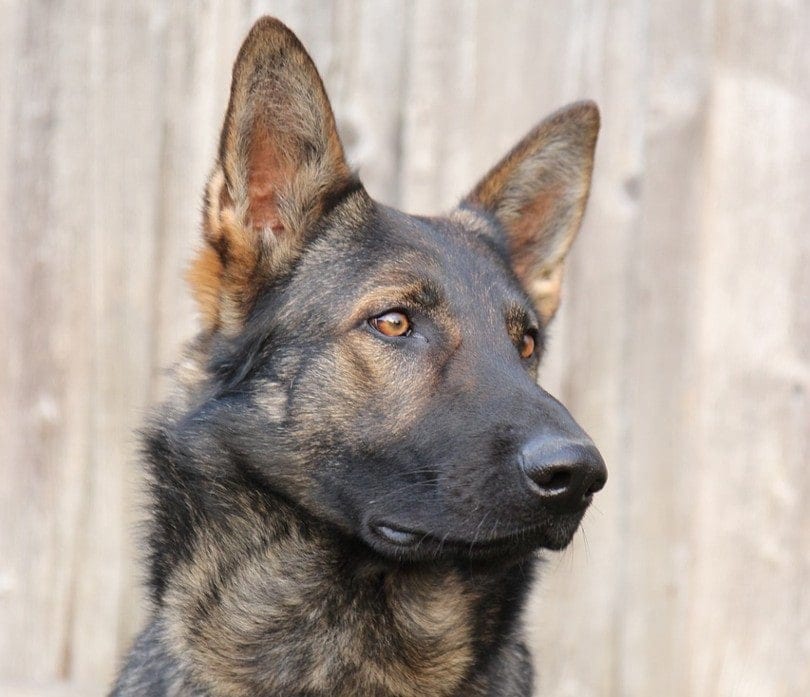Are Newfoundland Dogs Aggressive? Temperament & Personality Traits
Updated on
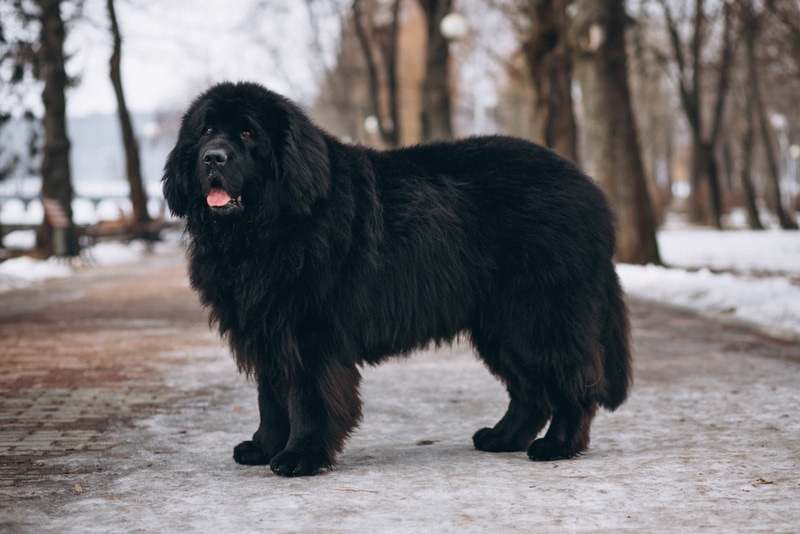
Newfoundland dogs are not aggressive. In fact, they have a calm and gentle temperament, making them excellent family pets and rescue dogs.
Most owners would describe their Newfoundland dog as affectionate and friendly. The breed is also good with children and is ideal for a family home. However, like any other breed, a Newfie’s behavior depends on socialization and training. Let’s learn more about Newfies and their tendency to be aggressive.
Are Newfoundlands Aggressive With Other Dogs?
Newfoundlands are on their best behavior around humans. But do they extend the same courtesy to other dogs? It depends.
Most Newfies are not aggressive towards other dogs. But some may be. Here are some reasons:
Dominance
Dogs may have been domesticated, but they’re still pack animals. Packs have hierarchies, with the alpha leading the rest.
If you already have a Newfoundland dog at home and you bring in a new pet, your Newfie might be aggressive towards the newest family member. For example, your dog may refuse to share toys or food bowls, snarl and bark at the other pet, or even growl.
Mild aggressive behavior is not a sign of concern. You should remain calm and allow your Newfie to warm up to the new dog. Get help if the Newfie is biting, nipping, or lip curling. If you find it lunging at the new dog’s back, throat, or abdomen, you should intervene right away.
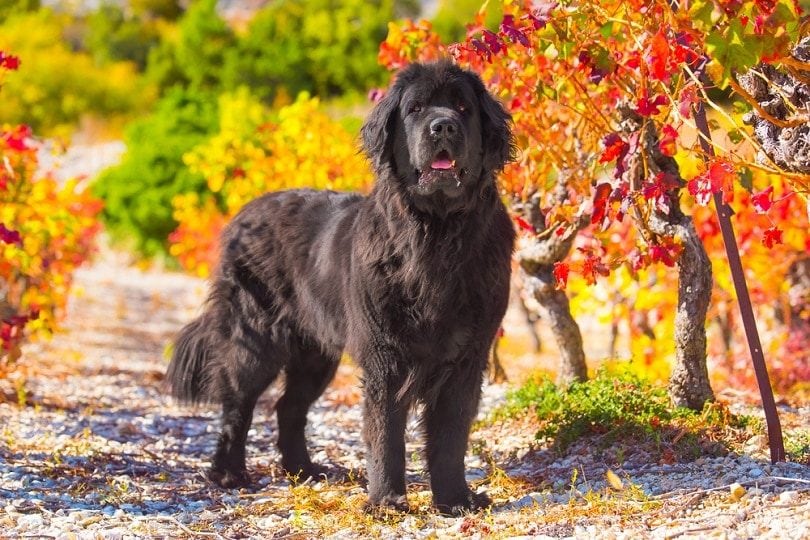
Territory
Dogs have a natural tendency to establish their territories. So, they protect what’s theirs, such as their food, toys, owners, and beds.
If your Newfie spends a lot of time inside the house and hasn’t been socialized properly, they may become territorial. They would exhibit aggression towards other dogs that enter your property.
For example, they may growl at a guest dog or bark at squirrels, birds, and other animals. The best approach is to calm your dog down and train them to respond to commands.
Fear
Another reason for inter-dog aggression is fear. Your Newfie may be scared of a bigger or unfamiliar dog. Common signs of fear-based aggression are barking, backing away, or looking away from the other dog.
Protective Instincts
Newfoundland dogs are very protective of their owners. If your dog feels like you are under threat, they will be aggressive toward the source of danger. In case the danger is another dog, your pet may attack them or growl at them.
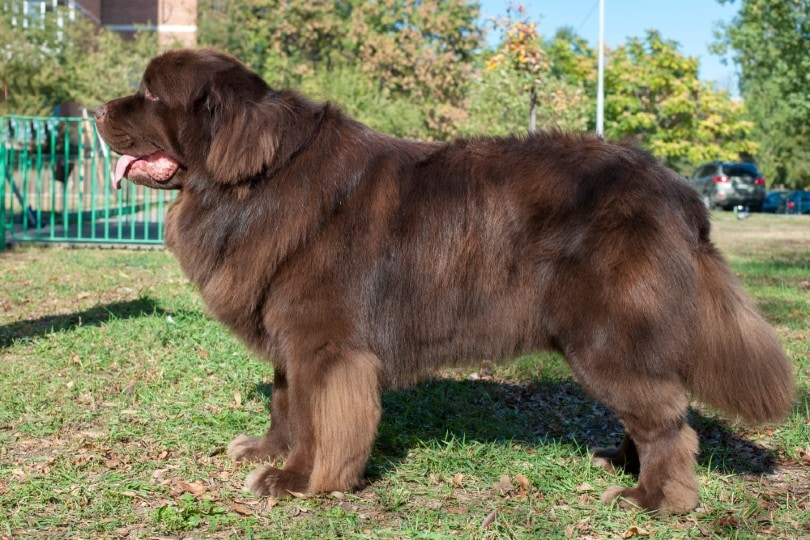
Why Might a Newfoundland Be Aggressive Towards Its Owner?
Newfies might show aggression towards their owners in some cases. Here are some reasons your pup might be acting this way:
Anxiety
Dogs may get anxious for several reasons. Separation anxiety is a big concern, especially if you spend a lot of time outside the house. If your dog is too attached to you, they will feel anxious when you’re gone for extended periods.
Dogs may also get anxious around the holiday season when fireworks and loud noises are more frequent. If your pooch is scared, they may bark and growl at you in an attempt to protect itself.
Some dogs also get scared or anxious around unfamiliar people. If you have guests over with kids running around the house and loud chatter filling the environment, your pup may become overstimulated.
Some signs of anxiety-induced aggression are:
- Compulsive behaviors
- Restless
- Pacing
- Drooling
- Excessive barking
You should destress your dog by taking them out of the stressful environment. It also helps to spend time with your pet and talk to them in a comforting tone.
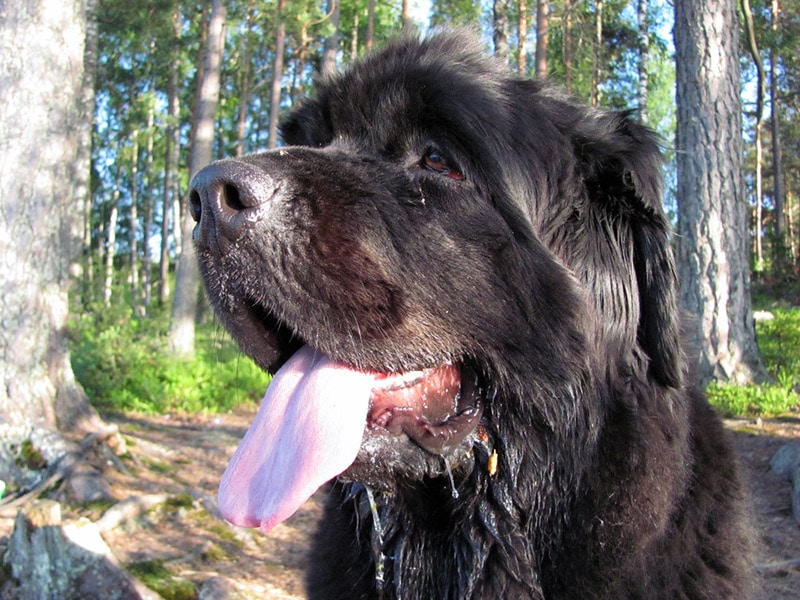
Illness
Is your well-behaved Newfoundland suddenly being aggressive towards you? An underlying illness could be the reason.
When dogs get sick, they act out of character and may get aggressive. You can test this by doing things your dog generally likes. For instance, many dogs like ear scratches. But if your dog is snarling at you if you touch their ears when they normally enjoy it, it’s possible your furry friend has an ear infection.
When they get sick, Newfies may growl or be generally irritable. It’s best to seek medical help immediately.
If your dog has resorted to biting, you should look out for signs prior to a bite to stay safe. Here are some of them:
- Growling
- Showing teeth
- Intense eye contact
- Tense body
When you take such a dog to the vet for treatment, you should also ask the vet to recommend you to a certified animal behaviorist. Or you can find someone through the Association of Professional Dog Trainers.
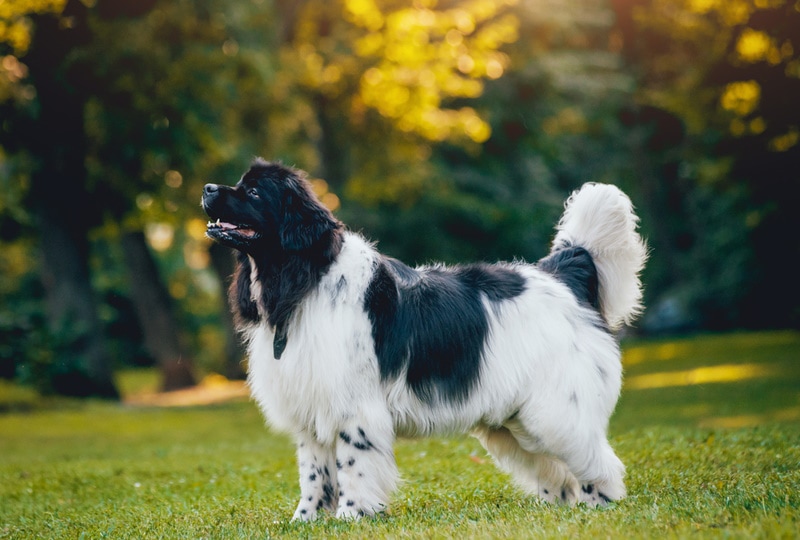
How to Differentiate Between Reactivity and Aggression
It’s possible that your Newfie is not aggressive but simply reactive. Here are some behaviors owners confuse with aggression:
Rough Play
Playing is an integral component of canine interaction. Some pups may mock fights, while others may jump around a lot. If you have multiple dogs at home, dog play could get intense. At first glance, it may even seem aggressive since dogs can get loud. But rough play does not always mean your dog is being aggressive. If the Newfie has positive body language and is not harming the other dog, they’re just having a fun time.
Nipping and Mouthing Pups
When young Newfies play with you or other dogs, they use their mouths to interact. Sometimes, they may nip harder than they should. Their nipping behavior isn’t stemming from aggression but from over-stimulation.
It’s possible your pup needs a break. You can also teach them how to control the biting by providing treats or praise when they show appropriate behavior.

How to Handle an Aggressive Newfoundland
Dealing with an aggressive pet can be challenging, but there are many things you can do to modify a Newfie’s behavior and keep everyone safe.
Aggression Towards Other Dogs
If your Newfie is aggressive towards other dogs, here’s what to do:
- Identify the Triggers: Your pet may be fearful or jealous of the other dog. It’s also possible that a Newfie is feeling threatened by a new dog. Knowing your dog’s triggers can help you control them.
- Provide Socialization Training: You should start socializing your pup as soon as they turn 7 to 8 weeks of age. Early socialization training will reduce the risk of a Newfie being aggressive as an adult.
- Use Positive Reinforcement: You can modify your pet’s behavior through positive reinforcement. Reward the dog for positive behavior, such as playing with a new dog or sharing their water bowl.
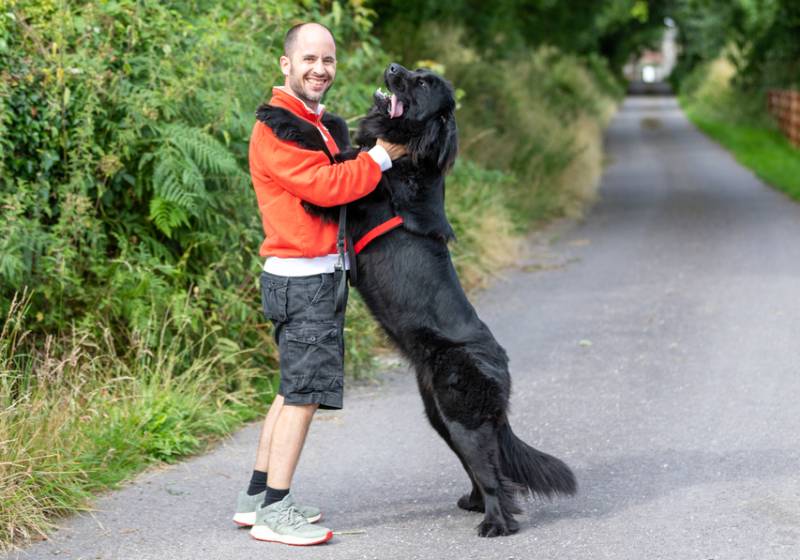
Aggressive toward family Members
VCA Animal Hospitals recommends identifying situations in which your dog shows aggression towards family members. Then, you should prevent access to these situations.
For example, you can manipulate the environment or keep your dog in a cage. If a confrontational situation occurs, you should control your dog by keeping them on a halter or leash. However, your long-term goal should be to avoid these situations rather than deal with them. Keep your dog on a leash or put a collar on them to prevent aggression inside your property.
If your Newfie has succumbed to biting family members, you can also put a basket muzzle over the mouth. Retraining is vital in this regard. Otherwise, your pet will not change their behavior.
Training for Aggressive Dogs
Training can be very helpful in keeping a Newfoundland well-behaved. If you notice signs of aggression in your dog, consult a veterinarian, or you can search for a professional dog trainer yourself. The dog trainer will use behavioral modification techniques to modify your pup’s behavior.
Keep in mind that while you may be able to modify mild aggressive behaviors, a professional is your best bet for a Newfie that doesn’t obey your commands or is a danger to people.
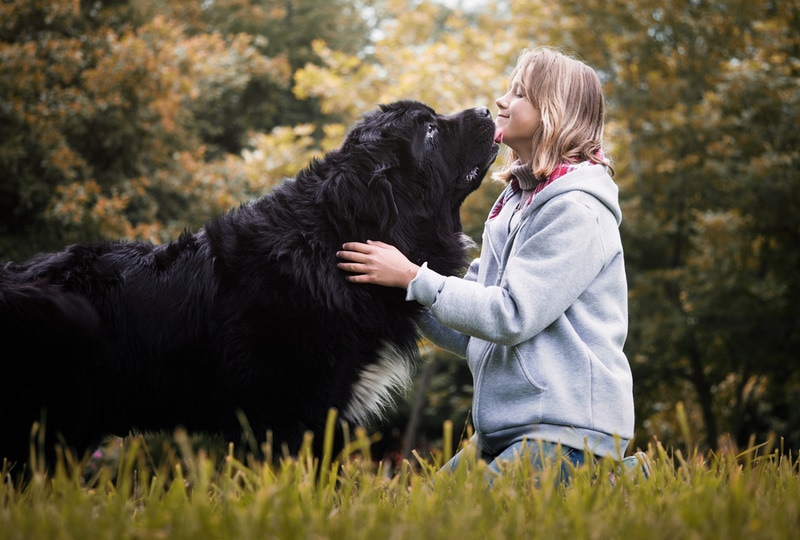
Is There a Medication for Aggressive Dogs?
There is no licensed medicinal drug for inter-dog aggression. However a vet may recommend some behavioral medications to calm down your pup. Medication can help dogs who are aggressive due to hyperexcitability or anxiety. Depending on your pet’s condition, you may have to administer these meds daily or for situational events.
Vets measure successful treatment by a decrease in the frequency or severity of aggressive incidents. Even if your dog seems to have forgone the aggressive behaviors, a relapse is possible.
As an owner of an aggressive Newfie, you must work with vets and animal behaviorists to ensure your pet’s safety and yours.
Conclusion
Newfoundland dogs are generally not aggressive and behave well around strangers, children, and other dogs. But they may exhibit aggression when sick, anxious, territorial, or scared.
Inter-dog aggression may also arise if you bring a new pet home. The best way to deal with Newfie aggression is to hire a professional dog trainer. You should also consult a vet for medical intervention. Even better, avoid aggression in your pet by providing early socialization training.
Featured Image Credit: PH888, Shutterstock

